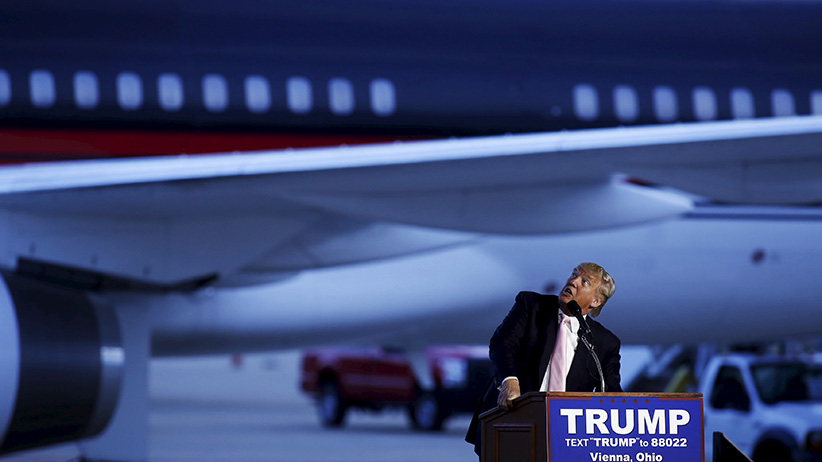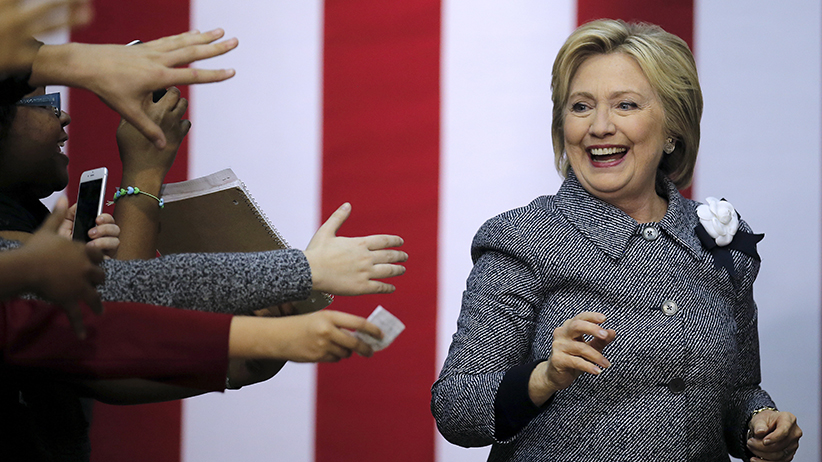Another step in democracy’s deliberate march
Donald Trump and Hillary Clinton pad their leads, while the presidential race itself gets both clearer and muddier. Allen Abel reports from Florida.
U.S. Republican presidential candidate Donald Trump speaks at a campaign rally at Winner Aviation in Youngstown, Ohio March 14, 2016. REUTERS/Aaron P. Bernstein TPX IMAGES OF THE DAY – RTSAFQE
Share

Republican voters questing for clarity in the U.S. presidential campaign engineered the opposite result Tuesday, locking their party’s primary race into an incomprehensible matrix of proportional delegate-selection rules that left the fulminating billionaire Donald Trump both closer to and further from clinching the nomination than he was when the day began.
In the populous states of Florida, Ohio, North Carolina, Missouri and Illinois, a scattershot electorate gave Trump a majority of the day’s delegates, while still leaving Texas Sen. Ted Cruz with a mathematical map toward the nomination and affording Ohio Gov. John Kasich yet another last gasp in states to be heard from between now and the Ides of June.
But Florida Sen. Marco Rubio—once thought to be the very personification of a diverse, young, Spanish-speaking Republican marching eagerly toward a New American Century—was obliterated in his home state by the snarling, profane, blame-the-foreigners fury of the Donald.
Rubio abandoned his campaign as the sun set over the Gulf of Mexico, saying that “it is not God’s plan that I be president in 2016. Or maybe ever.”
On the opposite Florida coast, Trump claimed victory in the ballroom of his meagre 112-room cottage in Palm Beach, where Wednesday’s sunrise will illuminate yet another chapter in his contemptuous cannonball run toward a smaller, less pretentious shack in Washington.
“The fact is, we have to bring our party together. We have something happening that actually makes the Republican Party probably the biggest story in the world. Everybody’s writing about it … all over the world they’re talking about it. Millions of people are coming out to vote,” he said. “It’s an incredible thing.”
Kasich won all 66 of the national convention delegates from the Buckeye State, while Trump claimed all of Florida’s 99. Those were the first and so far only winner-take-all states of the Byzantine, multi-year process, leaving both Trump, Cruz, and Kasich eligible to hie toward next week’s primary in Arizona packing prognoses of victory, with more than a thousand delegates yet to be chosen and the prospect of a multi-ballot convention in Cleveland looming larger than ever.

On the opposing bench, former Secretary of State Hillary Clinton demolished Sen. Bernie Sanders in Florida, North Carolina and Ohio. Even a pair of closer finishes in Missouri and Illinois left the socialist democrat with virtually no arithmetical highway to the nomination, thanks to the hundreds of undemocratically selected Democratic “superdelegates” who already have pledged to back Clinton at the Philadelphia convention.
“Well, I’ll tell you, this is another Super Tuesday for our campaign,” she said. “Tonight, it’s clearer than ever that this may be one of the most consequential campaigns of our lifetimes.”
In the Sunshine State, it was a truly remarkable day, as a Maclean’s correspondent discovered at polling places across the spectacularly diverse electoral landscape of south Florida.
On Calle Ocho in Miami’s Little Havana neighbourhood, the older Cuban exiles who were exiting the famous Versailles Café that serves as the barrio’s capitol were of one mind about the Donald.
“He’s loco,” said a woman named Concepción Herrera.
“He’s a clown,” agreed a grandmother named Teresa Pérez. “The world is laughing at us. Do we really want a clown to represent us?”
“He’s a little Mussolini,” said 84-year-old Juan Hernández. “I’m afraid of him. Do you know the power that the president of the United States has? His hand is on the button. I am afraid of that, but I am only a little grain in a big sack.”
Pérez and Hernández both were ardent supporters of Sen. Rubio, unwilling to surrender, even as he teetered on the lip of oblivion before finally tumbling over the edge.
Across Florida—as it has been across the nation during this insanely odd and fascinating trainwreck of an election season, with dozens of states and millions of citizens yet to be heard from—voters were passionately divided. Not on issues nor philosophy, mind you, but on one man and one man alone.
“He’s crazy,” summarized a woman who would only give her first name, Elizabeth, after voting in the ornate clubhouse of the Century Village retirement community in Boca Raton. “If Trump gets elected, he’d better get some good advisers, who he won’t listen to anyway.”
“I like him,” countered Mary Cimino, walking from the same polling place. “He’s a fighter, and I think he’ll do what he says he’ll do.”
An hour to the north, not far from Mar-A-Lago—Trump’s vainglorious Versailles in the seaside slum of Palm Beach—an armada of topless Maseratis, steel-hulled Bentleys, and cut-rate Benzes glided to a stop at the town’s Spanish Colonial-style fire hall to discharge voters of all stripes and ages, many of them well into their 90s.
One of them was a lady named Susan (she also declined to give her last name), a self-described doyenne of the fashion industry who said she had worked with the Donald many times on business and charitable ventures, back in little old New York.
“He hasn’t changed at all,” she told Maclean’s. “With Donald, you always get bang for your buck, and at a good price.
“He is the same man whom I have always known. He only fights back when he’s being attacked,” she went on, eliding into a navy-blue Jaguar convertible after voting. “It’s the Brooklyn in him. He was born with it.”
A citizen named Bob Slater said that he and Trump had been schoolmates, though a few years apart, at the New York Military Academy in the Hudson River valley, long ago. Slater remembered how handsome young Trump had looked in uniform, and how certain instructors “would beat the shit out of us if we didn’t do our homework.”
“When I look at him today,” Slater said, “I see a man who actually wants to help, someone who wants to do something good for this country.”
“Oh, Bob!” gasped a woman (and Sanders supporter) named Meghan Hurley, standing nearby. “You can’t mean that!”
Democrat Hurley, who previously lived in Burlington, Vermont—where Sanders served four two-year terms as mayor before entering Congress—said that she believed that the doge of Mar-A-Lago was running for president for only one reason: so that he could flex presidential prerogative and get the Secret Service to ban jets on final approach to the Palm Beach airport from flying right over his house.
“Are you going to move to Canada if Trump is elected?” Hurley was asked.
Bob Slater begged to interrupt.
“I’m moving to Canada if he’s NOT!” the Palm Beacher said.
Related: Envisioning 2017’s refugee crisis: Americans fleeing to Canada